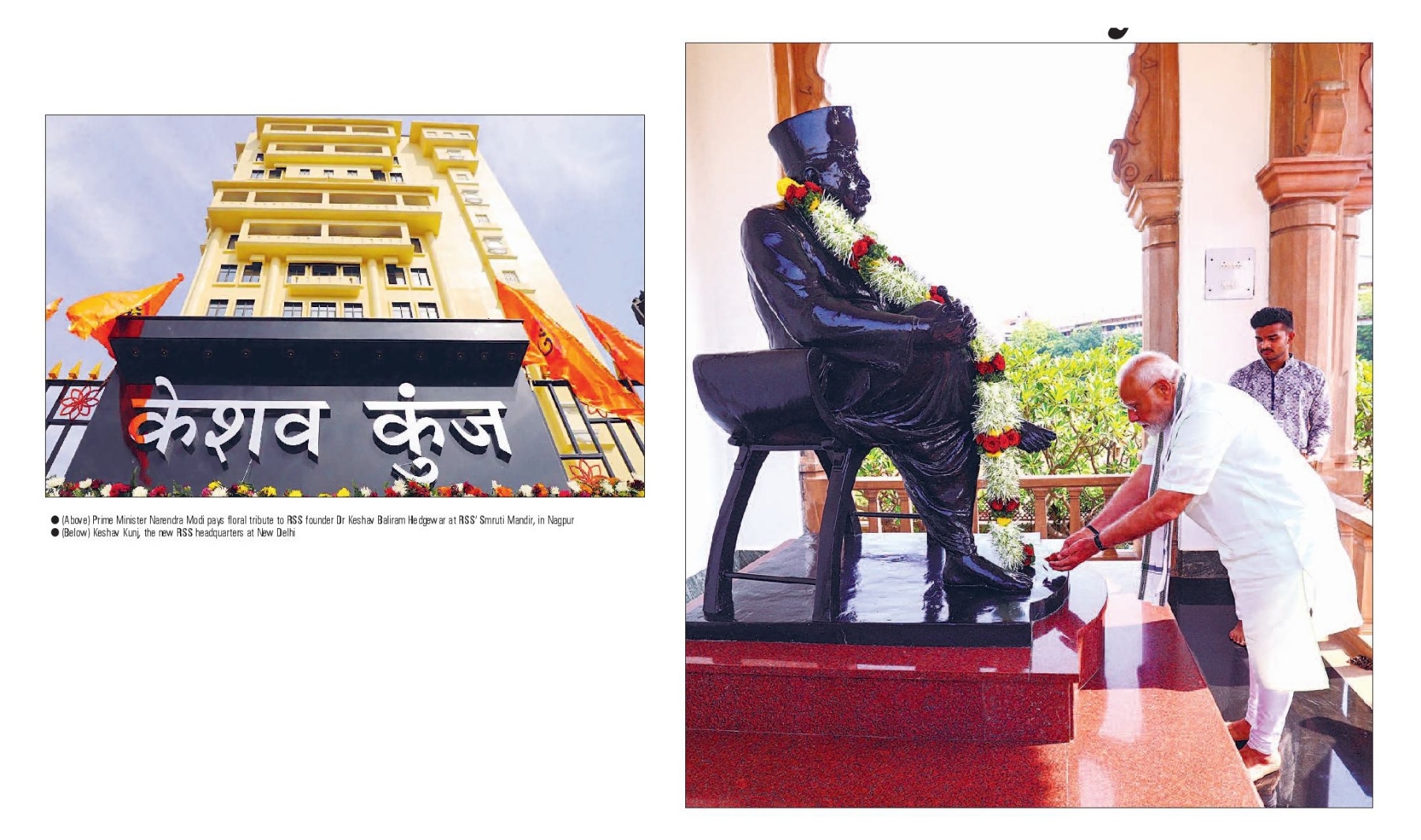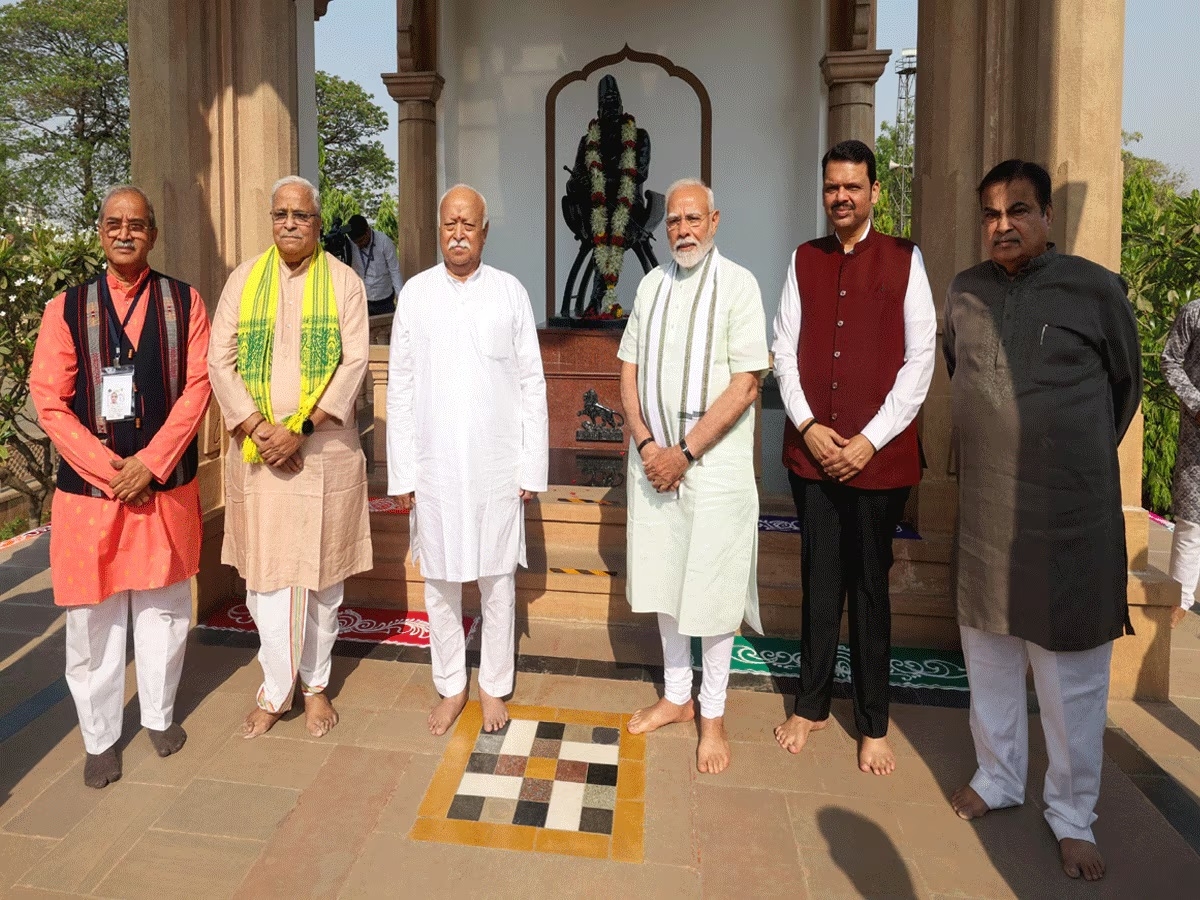The 100-Year Journey - III RashtriyaSwayamsevakSanghTheApril 13, 2025Hitavada Insigh MELANGE I LIFESTYLE I NATUREt■ Mail us your feedback at magazine@thehitavada.comThe story oflofty -but practical -ideals
| Date :13-Apr-2025 |

By VIJAY PHANSHIKAR :
The core value of RSS is to promote nationalism beyond politics and beyond social fault-lines. To achieve this, it has created a structure and style of organisational management that has survived through vagaries of time...
“So, finally Prime Minister Narendra Modi will
surrender before the RSS leadership at Nagpur.
The RSS is unhappy with the BJP and Narendra
Modi must now placate the RSS antagonism. For
the past ten years, he did not care to visit the RSS
Headquarters. But now, the situation calls for his
surrender”.
- The gist of media and political speculation
doing the rounds in the country
MARCH 30, 2025 -- Gudhi Padwa (Hindu
New Year Day and birth anniversary of
founder of Rashtriya Swayamsevak Sangh
Dr Keshav Baliram Hedgewar) -- will get
written in the Sangh history as a very
important day and date. For, on that day, as the RSS
completed its 100 years since inception, Prime
Minister Mr Narendra Modi made a trip to Nagpur to
visit the memorials of Dr Hedgewar and second
Sarsanghachalak Shri Madhav Sadashiv Golwalkar
‘Guruji’. The Prime Minister also shared a public platform with RSS Sarsanghachalak Dr Mohan Bhagwat
and asserted that the RSS was the banyan tree --
Akshay Vat -- of Indian culture (from which the larger
society draws its sustenance).
Mr Narendra Modi became the second Prime
Minister to visit the RSS headquarters, the first being
Mr Atal Behari Vajpayee.

● Prime Minister Narendra Modi along with Union Minister Nitin Gadkari, Maharashtra Chief Minister Devendra Fadnavis, Rashtriya Swayamsevak Sangh (RSS) Chief Mohan Bhagwat and others at RSS’ Smruti Mandir, in Nagpur.
The visit took place under
intense public glare as rumours were doing the rounds
about possible differences between the RSS and the
Bharatiya Janata Party. Intense political loose talk in
the media and political circles also surrounded the visit -- paving the way for further speculations about the
manner and method of the functioning of the RSS.
The Prime Minister’s visit to Nagpur also marked the
centenary of the RSS -- though the organisation chose
not to make a celebratory splash on the occasion. In
the evening of March 30, there was a massive gathering of the Swayamsevaks at Nagpur, addressed by a
couple of RSS luminaries, all right. But that was taken
as a routine event -- though attended by more than
10,000 Swayamsevaks who were digitally registered
for accurate data-gathering. On the sidelines of that
eventful day, senior RSS functionaries and
Swayamsevaks insisted that it was it was only
unfortunate to connect politics to any development
within the Sangh Parivar.
As a person who has watched the RSS seriously
without any political intention, this scribe can assert
that it is only foolhardy to consider the RSS as a
political organisation. It is true that the RSS has never
shied away from its national responsibility when
things came to crunch even in politics. Yet, its core
value is nation-building through man-moulding --
manushya-nirman se rashtra-nirman.
Despite this, the RSS has always remained shrouded
in political gossip -- which reflected itself when Mr
Narendra Modi visited the Smruti Mandir in Nagpur on
Gudhi Padwa. There should be no doubt that the RSS
and the BJP often engage themselves in intense
deliberations on national situation from time to time.
When two of the country’s central organisations stand
on a common foundation, then there is likely to be
some scope to have different opinions and approaches
on issues. But the beauty of the Sangh Parivar is that
it is a community of institutions set up to serve
different purposes that ultimately serve the larger
India vision that prompted the foundation of the RSS a
hundred years ago.
No matter the political speculations, the RSS has its
own way to handle such situations. As a political
observer said long ago, the RSS leadership enjoys
keeping the political community confused about what
the organisation is all about. The trouble, actually, is
that those in politics and public affairs and the media
have not made sincere attempts to understand what
the RSS is all about. That is mainly so because they
have never tried to understand the alignment of its
original purpose and age-old practice. For, they have
missed the intent expressed by RSS founder
Dr Hedgewar and his subsequent successors without
any deviation. It is pertinent to understand what
Dr Hedgewar told Mahatma Gandhi in the winter of
1934 in Wardha, nine years after the inception of the
organisation.
The RSS had organised its training camp at Wardha
(Maharashtra). Mahatma Gandhi also was visiting his
Sevagram Ashram at the same time.
Through his
personal secretary Mahadevbhai Desai, Gandhi Ji
communicated to the RSS office-bearers at Wardha his
inclination to visit the training camp. The RSS officers
agreed and Gandhi Ji visited the training camp on
December 25, 1934 at 6 in the morning. The Mahatma
found about 15,00 Swayamsevaks in uniform -- and
appreciated the sense of discipline, cleanliness and alertness etc. To Mr. Appaji Joshi, a
close aide of Dr. Hedgewar, the
Mahatma said, “I am very happy. I
have not seen a more alluring scene
than this”.
The next day, on December 26,
1934, Mahatama Gandhi also met Dr.
Hedgewar and asked him what the
definition of a Swayamsevak was.
Dr. Hedgewar said (as quoted by
senior RSS functionary Mr. Sunil
Ambekar in his book The RSS
Roadmaps for the 21st Century --
Rupa Publications 2019), “One who
would happily, of his own free will
and with goodwill towards all, succeed in submitting everything for the
national cause, I would consider his
a swayamsevak leader. My target is
to raise such swamyamsevaks. In
this organisation, there is no difference between a leader and a
swayamsevak. We are all swayamsevaks.
Bearing equality towards all,
we make no distinctions and have
no place for hierarchies.”
O
F COURSE, an organisation
must have its hierarchy, all
right, the RSS is no exception.
Yet, over time, it has perfected a system of command and control that
has helped the organisation for the
last hundred years -- with some
appropriate changes in the systems
as needed by changing times. But
those who keep making wild guesses and loose talk about the RSS and
its (so-called) political activity often
go terribly off-mark because they
have not tried to understand the core
thought of the organisation, its original purpose of being, and its management systems. If they do that,
they will be able to decipher the
RSS thought and action more accurately.
One of the most intriguing aspects
of the RSS is its philosophy of its
own existence. Around early 1970s
when the then Sarsanghachalak
Golwalkar ‘Guruji’ was recuperating
from a critical surgery, this scribe
picked up courage to ask him a naive
question, in effect, if he was concerned about his years left and worried that the work would be left
unfinished. ‘Guruji’ smiled and said,
in effect, ‘The work the RSS does is
in line with historic task of nation
building that has been going on for
centuries and being carried on by
great men and women.
To think that
such a work would remain unfinished if one lifetime is over, is totally
wrong’.
This sense of continuity with history, such sense of nationalism has
been at the core of the RSS and its
thought and action. At times, the RSS
may find itself engaged in some
political thought -- NOT activity. But
its core value is to promote nationalism beyond politics and beyond
social fault-lines. To achieve this, it
has created a structure and style of
organisational management that has
survived through vagaries of time.
This is best explained through an
age-old slogan the RSS often put forward -- ‘Sangh Samaj Banega’ --
means Sangh (RSS) would become
society. In other words, it works
towards an ideal situation when RSS
and the society become one singularity.
This is not poetry. Those who have
watched the RSS seriously know
that a serious effort is being made for
the past one hundred years to make
this Sangh Samaj Banega singularity
practically possible.
This may appear
to be a lofty ideal, all right. But every
elevation of larger human society to
the next level has come only through
pursuit of lofty ideals.
As the RSS steps into the next
century, its challenges are going to
be far more complex than ever. Yet,
those who have studied the organisation also realise that the RSS is
engaged in a serious preparation to
meet those challenges that India and
the world would face. There is every
reason to believe that it -- the RSS -
- would continue to be one of the
drivers of the idea of New India and
its position as the world leader --
Vishwa Guru -- in a true sense .







